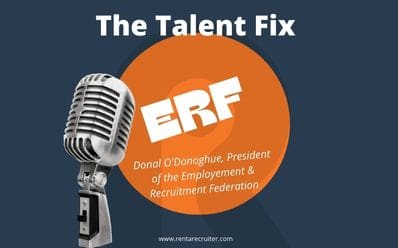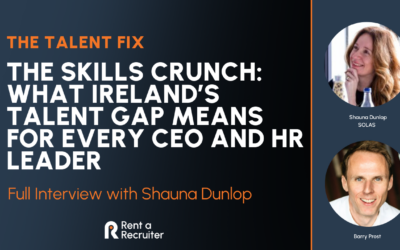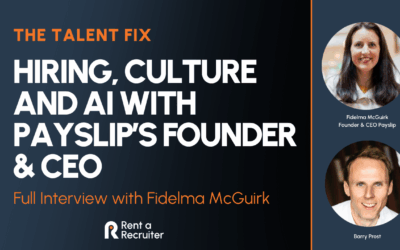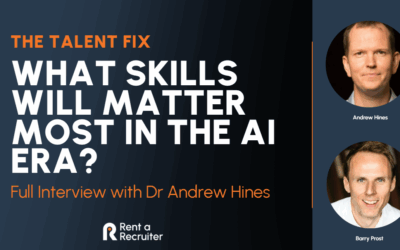The Talent Fix Speakers
Barry Prost has 20 years experience in international recruitment and has co founded award winning brands in the sector including Propel Consult, Yala, and now Rent a Recruiter, whose mission is to be a leading international, technology lead, embedded recruitment services provider with operations in Ireland, US, Middle East and Australia.
Donal O’Donoghue has worked in the recruitment industry for 27 years. He is currently the President of the Employment and Recruitment Federation in Ireland, which is the representative body for staffing and recruitment firms. In addition Donal is the Managing Director of Sanderson.
The Talent Fix Podcast
[00:00:09.070] – Barry Prost
Donald Donoghue, I’m delighted to welcome you to this episode of The Talent Fix. Look, thanks a lot for your time. You might be disappointed to know, Donald, that you’re actually the second President. You’re not the first president, we’ve had on the show, but you’re in good company. Without further introduction, if you could just give an introduction about yourself, what you’ve done and the extensive experience you’ve got in the industry.
[00:00:32.840] – Donal O’Donoghue
Well, thanks, Barry. It’s great to be here with you today. So, my background, I’ve worked in the staffing and recruitment industry since 1996, so whatever that is, I think 26 or 27 years or something like that now. So, a long time. I am currently the President of the Employment and Recruitment Federation in Ireland, which is the representative body for staffing and recruitment firms. I’ve worked with yourself on the committee there and other industry leaders from the sector, so that’s a real privilege. And then the real day job is I’m MD at a company called Sanderson. Sanderson are what we would consider, I suppose, on the path to becoming a global staffing recruitment executive, search and outsource, recruitment and talent management business. So, we’re currently based in Ireland, the UK, Hong Kong, Singapore, Australia and India. And our growth has been both a combination of organic growth and more recently through mergers and acquisitions. So very exciting time for us. And when I’m not doing that, I do a little bit of lecturing on the BA honours and Recruitment Practise at the National College of Ireland and some business advisory services for companies and staffing recruitment technology that are looking to grow.
[00:01:51.310] – Donal O’Donoghue
So that’s, I suppose, a quick overview.
[00:01:53.530] – Barry Prost
Fantastic. And just on that, you’re obviously incredibly busy. I know we’ve had a chat about this on a few occasions, but how do you manage the role between president of the Employment Recruitment Federation in Ireland and your role in leading Sanderson’s business? I mean, it must be incredibly time consuming.
[00:02:12.260] – Donal O’Donoghue
I like to be busy. When I was younger, I was an athlete, so I was used to organising my time, so I would obviously work full time and then train three nights a week, coach two nights per week and then do squad sessions and travelling for competitions and that kind of stuff on the weekend. I’m also a dad to three children, so I think you just need to be a little bit organised, I tend to operate on not too much sleep. So I like to get up fairly early and get stuck into the day and like to be busy.
[00:02:50.100] – Barry Prost
Good stuff. We started in recruitment, I think, roughly around the same time. And you’ve seen it through many iterations and many kinds of threats. I’d love to get your thoughts in terms of how would you sum up the change in the industry since we’ve been in it and also what kind of challenges face the recruitment industry, both from the point of view of maybe the agency perspective, but then also looking at it our client’s perspective from talent acquisition perspective as well. It’d be great just to get a couple of insights from you on that point, Donald.
[00:03:22.920] – Donal O’Donoghue
Yes, so I suppose there’s probably two things that have happened during the time that I’ve been working in recruitment. The first is that the recruitment market now, and if you look at Ireland and the UK, the market is now mature. So, when I say it’s mature, there’s a better understanding in terms of buyer expectation from clients. Clients tend to have a good understanding of what the different products and propositions available from agency partners are. I think what’s probably changed a lot over the years is that HR has become more sophisticated looking at the value of an employee over the entire employee lifecycle, procurement has become involved in procuring recruitment services through tenders, whether public or private tenders. So, the need to, be able to define your services and to offer value and added value and long term value, I think is something that’s probably evolved. But really the nuts and bolts of the job in terms of assessment, sourcing judgement, speed to market innovation, the nuts and bolts are the same. Technology has obviously been a great enabler for us, but I think that’s what we’re looking at now, it’s a mature recruitment market.
[00:04:39.240] – Donal O’Donoghue
We’ve all been through ups and downs and the pandemic, we’ve been through recessions and we’ve seen what businesses, staffing and recruitment businesses need to do in order to survive and thrive in those conditions. And ultimately, we’ve seen it from the client’s perspective as well in terms of how they access talent in the labour market in different economic conditions.
[00:05:00.010] – Donal O’Donoghue
So I think that’s probably the first kind of key trend that I think about, is that evolution of the kind of flexible and contingent workforce. That’s something that’s really, I suppose, changed over the last 20 years.
[00:05:13.150] – Barry Prost
Great. So, as readings, an interesting piece of advice that I think you received, your best piece of advice that was given to you was around writing down your goals. I’m keen to know, obviously, from a leadership perspective, how do you get the best out of your team and what advice, rather than the best advice given to you, what would be kind of the best advice you give to them? In terms of performance…
[00:05:37.540] – Donal O’Donoghue
Really depends on the individual and that kind of whole concept of situational leadership is really important. So, for me, I’m really fortunate. I have a brilliant team that have been with me for many years. So, the team at Sanderson Ireland. The leadership teams. The other directors have been with me since day one and I suppose we’re a close-knit team. But we are very different in terms of personal style. So we’ve definitely got the person that is the kind of influencer. We’ve got the analyst. We’ve got the ultimate team player. And I suppose we’ve got the robust kind of door opener. So, we’ve got a nice combination of personality kind of types that fit together really well to form a good team. So, I think as the leader of that team, it’s about trying to understand where people are at in terms of their career and their life and just giving them a pathway. So, at different times. People require different things from work and I think when a team is together and there’s a high performing team for a long period of time. You go through everything. You go through bereavements marriages. Divorces, recessions,
[00:06:48.430] – Donal O’Donoghue
Pandemics. And I think putting together a team that can deliver success for the shareholder and for the organisation over the long term is about just having those different people working together and helping them to play to their strengths and give them the space to get on with it. Rather than the temptation to over manage.
[00:07:08.280] – Barry Prost
Yeah, very good answer. Look, you mentioned the Pandemic there, so in terms of I know it’s something that we’ve spoken a lot through committee meetings and with the Employment and Recruitment Federation. What’s your view of the Pandemic? Do you think we’ve seen its impact and now we’re rebounding. Everyone’s got a view on remote working and how it’s going to finally play out, where the needle is going to settle. I’d love to get your thoughts on that.
[00:07:35.680] – Donal O’Donoghue
Yeah, well, I think the whole hybrid and remote working piece is very obviously the positive by product that came out of the Pandemic and I don’t think we’re ever going back. And I think the big question for me is why it took a pandemic for us to get to this point. And, like, even if you think about the business that we’re in, Barry, in the days gone by pre-pandemic, one of the things that you would have to look at as you’re scaling your business is what’s the capacity? How many desk spaces do you have in an office? And when you’re at that stage and you’re thinking, okay, well, there’s this many head count and my average productivity per head is this amount. And if I’m hitting those goals and I want to grow, then I need to lease another office space or buy a building or something like that. And I think now we’re just seeing that businesses aren’t constrained by such kind of arbitrary things. So that’s definitely the positive by product from it. I think the other thing that happened in a lot of organisations, I see it with our clients and I see it and also the staffing and recruitment companies, is that there was the ability to get some value.
[00:08:37.040] – Donal O’Donoghue
So, a lot of leases were renegotiated. A lot of our clients went from having a desk space available for every employee to maybe down to having 60% coverage with hot desking and so on like that. So, it allowed businesses during tough times to strip some cost and to maintain their profitability during slower times in the Pandemic and position them for growth. And I definitely think we saw that 2021 and the first half of 2022 so far have been very strong in terms of skill shortages, hiring and client organisations, obviously strong economic performance in terms of corporation tax receipts and so on like that. But now we’re facing into these times of the first interest rate increases for over a decade, very high inflation for the first time in a long time. So there are challenges around the corner. So, no sooner are we at the other side of the economic challenges of the Pandemic than we’re facing the challenges in terms of the supply chain, the impact of the war in Ukraine and a whole host of new challenges.
[00:09:41.070] – Barry Prost
Yeah, for sure. And in terms of I noticed there’s a term quiet quitting, getting a bit of traction now in the media. It got me thinking, as an employer who adopted a remote first model, this idea of not being able to manage by walking around anymore, is this kind of the next major threat facing employers do you think?
[00:10:03.620] – Donal O’Donoghue
I really don’t think so, because people that I think managed by walking around, that’s almost a PR exercise. And I remember years ago, people used to say that, well, our CEO was great because, he’d walk through the floor and he’ll go and he’ll have a chat about the weekend with somebody. And is that really leadership? I think that what we saw in the early days and the whole idea of managing by presenteeism and looking at, if you think about the halo effect, you have a new starter who turns up to work really early and is very enthusiastic and is quite clever about who they build relationships with and looks as though they’re doing a great job. That halo effect can kind of sustain, whereas I think now, with good data and insights and analytics, we’re actually looking at people’s contribution and their productivity, rather than just what appears to be the behaviours that would signal that somebody is doing a good job. So I definitely think that’s been an area that people managers have needed to transition a little piece, but I know you’ve gone with the remote first model. So, what we’ve done with at Sanderson as a global policy is hybrid three days in two days remote.
[00:11:15.120] – Donal O’Donoghue
But it’s very much about not coming in for the sake of coming in, but coming in when there’s the point of collaboration or getting together with teammates. And we’ve seen the things that we look at around productivity and engagement. It seems to be working quite well. But I think there’s also a loss of autonomy given to divisional leaders to manage their particular area according to what the business needs and according to what their people needs. So, I think that’s working quite well.
[00:11:42.810] – Barry Prost
Great.
[00:11:43.210] – Barry Prost
I know it’s a good balance, I’ve got my eye on the clock, Donald, but I’d love to finish off just with last question with two parts. What do you think the future holds. For businesses when it comes to recruitment? And what will you at Sanderson or what will other businesses do you think. Be doing differently in the future from a recruitment perspective?
[00:12:01.490] – Donal O’Donoghue
Yeah, I kind of touched on this earlier on. For me, it’s all about the growth of the contingent workforce. And what I think the main trend when I look at the next kind of three to five years is that historically there was a propensity to make permanent hires and to think kind of permanent first. And of course, there’s still a value in that. But there was probably a perception that flexible workforces were maybe more expensive, that professional contractors expect to be paid a premium of maybe 30% or 40% on what their permanent equivalents would need. But I think the whole maturation of the labour market has shown that if you think about professional contractors, okay, they may get a premium of 30%, but the employer is now if they’re hiring them through a limited company, is saving the 11.5% employers PRSI, they’re saving the 5%-8% pension contributions they would have made and they’re actually bringing in the skills they need when they need them. So rather than having somebody on the payroll indefinitely, they’re able to bring in the very specific skills that are needed when they are needed. So I think that’s particularly important when you look at organisations that have change and transformation projects that they need to resource or want to, for example, enter a new market or test out a new product or proposition or something like that.
So, I think that’s key. And it’s not just about professional contractors, it’s the development of the temporary agency worker as a solution for businesses as well, where again, where an organisation maybe isn’t ready to commit to adding permanent headcount that they can bring in teams or people at busy periods or for gap fill or for maternity coverage through an agency model. And then of course we know that probably 30 or 40% of those people will end up converting onto a permanent contract as well. So I suppose I’m thinking that we’re going to see further growth in the RPO market, I think we’re going to see further growth in the MSP market. And I think the big thing for the staffing and recruitment people that are listening in today is that I think the days of the low engagement transactional type of recruitment are really numbered. If your business model is entirely based on we will hire a person or a couple of people and charge a placement fee on success only I think that model is in decline and I think the businesses. Or the recruitment businesses that are able to go to a client.
[00:14:24.730] – Donal O’Donoghue
Analyse their hiring objective and come back with a meaningful proposition that represents value to the client and helps them to get access to the skills they need when they need them. And I know you’re doing it with your own business, Barry, and congrats on the rebrand of Rent a Recruiter. But that to me is the type of innovation that the sector needs. It’s something different. You’re offering a subscription model where clients can have certainty over their hiring spend over a period of time. And that to me is very similar to some of the work that we’re doing in Sanderson. We’ve got our projects business, we’ve got our RPO business and our MSP business, where we’ll go into an organisation analyse their spend, whether it’s permanent recruitment or non-permanent recruitment, how much value the client is currently getting, what can be done better, what are the commercial gains to be made and we’re signing into three-, four- or five-year contracts. And often being at the end of that period of time, we’re being reengaged again and again because the value is in that if you think about it. I can think of one customer in Ireland that has say 250 contractors, and they receive one invoice per month, and they’ve got access to the analytics to see which departments are spending on non-permanent hiring. What’s the average day rate? There’s complete rate card visibility around markup margin, etc. And from a procurement perspective, from a compliance and legal perspective and access to talent, I think that’s what the future looks like.
[00:15:50.630] – Barry Prost
Well, listen, on that note, I just want to say a big thanks to you, Donald, for your time this morning. And I think we covered an awful lot in a fairly relatively short period of time. So, thanks again to Donald Donahue, MDS. Anderson, and president of the Employment and Recruitment Federation. The Talent Fix is available wherever you listen to your podcasts.



